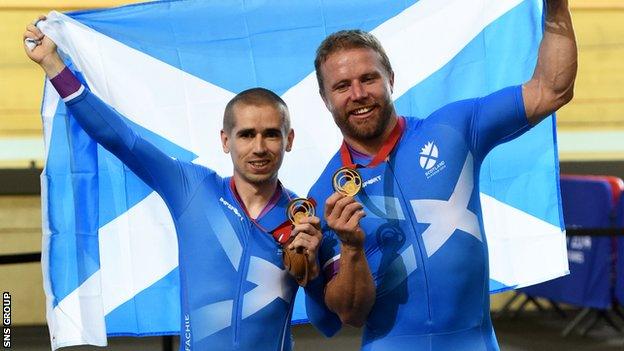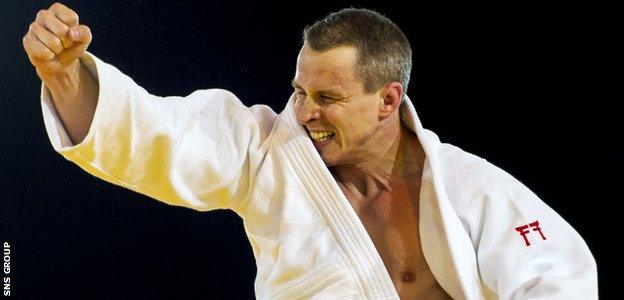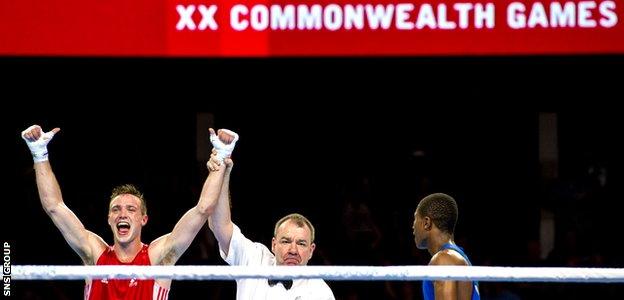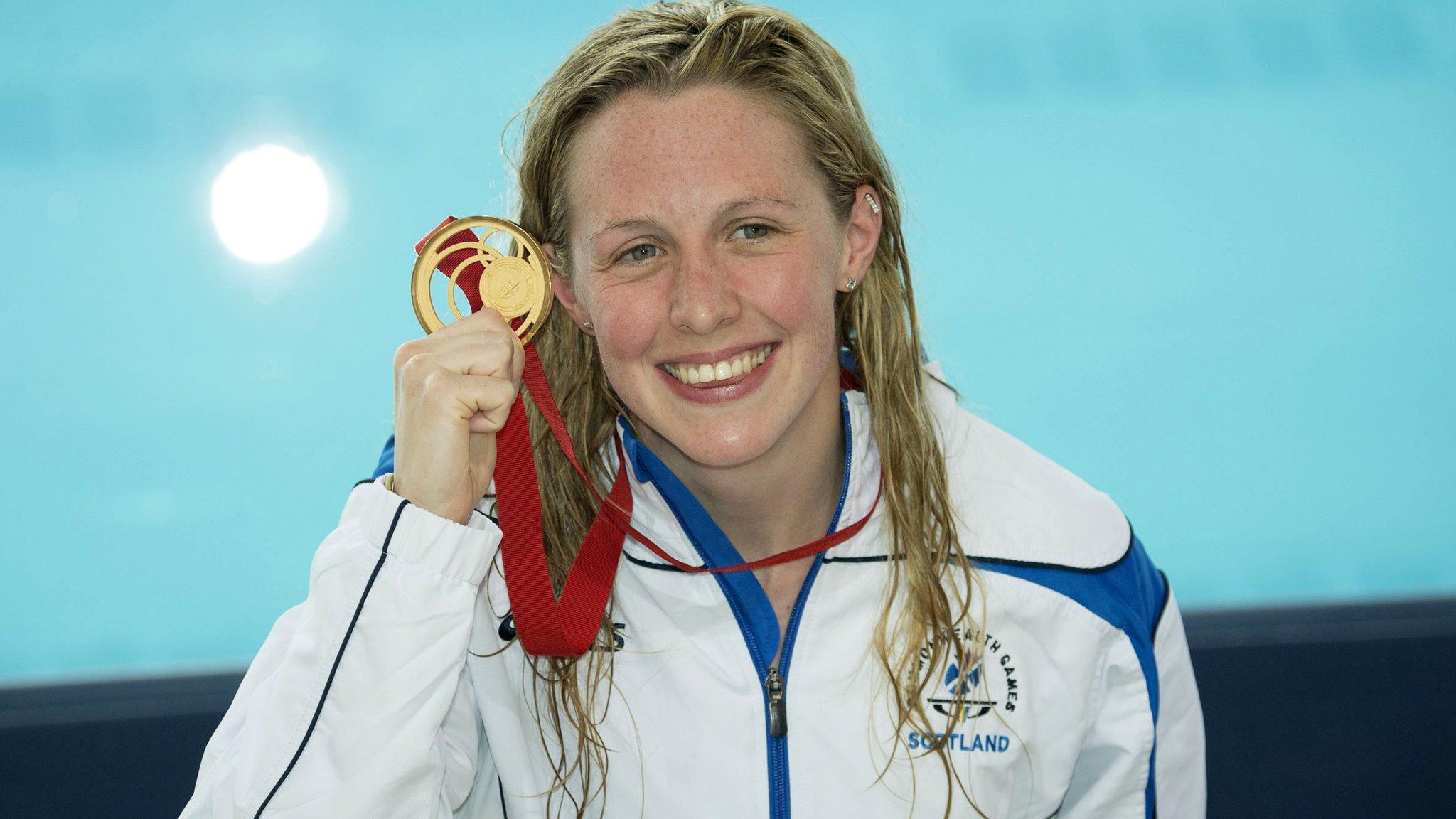Glasgow 2014: A glorious Games to remember for Scotland
- Published
- comments

Eleven days of competition and a lifetime of stories contained within. Stories of all kinds - stories of triumph over adversity and of greatness under pressure. Stories that made you laugh and cry and left you in awe.
It took just one night for Glasgow to become 'Glasgold'. At Tollcross, Hannah Miley answered the challenge laid down by the fast-emerging Aimee Wilmott of England. She put to bed the fear that she was a faded swimmer and swam 4 minutes 31.76 seconds to win the 400m individual medley - the second fastest time in the world this year.
The image of Miley standing atop the podium, choking back tears as she tried to sing her national anthem, was one that will endure.
The night could hardly have had a more thunderous conclusion. From emotion to shock as the great marquee act, Michael Jamieson, was beaten by the irrepressible Ross Murdoch.
That was another image that will be frozen in time. Murdoch and Jamieson in adjoining lanes, one with a look of stunned elation, the other with the demeanour of a broken man.
It wasn't just that Murdoch, only 20 years old, had beaten the Olympic silver-medallist in his favourite event, the 200m breaststroke, it was how he did it.
He swam 2:07.30, a time that would have been enough for silver in London 2012. The world record stands at 2:07.01. This wasn't just Commonwealth class, it was world class.
In Hall 3 of the SECC, where the judoka performed, there were more heroes to acclaim. From Coatbridge they came and back home they went with two golds from the one house. First Kimberley Renicks and then big sister, Louise - unstoppable, the pair of them.
Strange things were happening in the city. The sun was beating down and threatening to fry us to a crisp. And people were talking about judo. Only the experts knew what was going on, but everybody wanted a piece of it all the same.
The pool was less complex but every bit as stunning. Dan Wallace, a 21-year-old from Edinburgh now operating out of the University of Florida, won gold in the 400m individual medley and cried 'For Freedom' in the aftermath.

Euan Burton delivered one of six judo golds for the host nation
He wasn't the first patriot called Wallace to do so, but he was undoubtedly the only one who did it on the back of almost missing the Games after being arrested in America for urinating on a police car. Not three months before his night of glory, Wallace was living a nightmare.
His was one of the top comeback stories of Team Scotland.
Gold was the colour. Sarah Clark, bowed out of competitive judo by winning the under-63kg class. She was 36 and left on her greatest high - just how every sportsperson would wish to leave the stage.
At the Velodrome, Neil Fachie and Craig MacLean, put in the type of performance in the para-cycling 1000m tandem trial that Sir Chris Hoy applauded to the rafters. Then they did it again a day later, adding a second gold in the sprint.
That first Saturday was a gold rush. Euan Burton banished the awful memories of London 2012 and fulfilled a dream. Chris Sherrington and Sarah Adlington joined him in the pantheon of celebrated judoka.
The rugby sevens began at Ibrox and if there was no glory there for Scotland the scenes were remarkable none the less. Four sessions, each one packed. Almost 180,000 people went through the doors in two days. The Ugandan team were adopted by the home crowd. Happy bedlam from morning to night.
Stories that made the heart melt? Libby Clegg won gold in the 100m for visually impaired athletes and Hampden was electrified. Erraid Davies took bronze in the pool. The 13-year-old from Shetland finished third in the para-sport 100m breaststroke and stole the hearts of a nation. She was Scotland's youngest ever Commonwealth Games athlete and her smile was unforgettable.
.jpg)
Scotland's bowlers were star performers on the pristine lawns of Kelvingrove
Alex Marshall was remarkable for different reasons. Big Tattie, the Messi of Bowls, went bonkers after delivering the best end of his career, against England in the pairs semi-final. His run down the green and his 'Get It Right Roon' Ye' gesture went nationwide. Passion and hilarity in one champion bundle.
Tattie and his fellow golden wonders of Kelvingrove - Paul Foster, David Peacock, Neil Speirs and Darren Burnett - could not be more different to gymnasts Dan Purvis (parallel bars) or Dan Keatings (pommel horse), but they wore the same colour medal. Keatings left the Melbourne Games in a wheelchair. After missing London 2012 he almost quit the sport.
Perseverance paid.
Eilidh Child entered the narrative at Hampden. The poster boy was denied in the pool, but the poster girl delivered on the track. Such scenes in the stadium in celebration of her 400m hurdles silver medal.
We thought nothing could match it until Lynsey Sharp came along. If you were to pick one story from the Games then Sharp's tale would be on everybody's shortlist. Violently ill in the early hours of her 800m final and on a drip until 5.30am she took to the starting line with a severe handicap.
And yet she triumphed. Not gold, but the most sensational silver. And an achievement in adversity that was the epitome of heart and soul.
So many passed that particular test. The Scottish boxers were immense. Brave and ambassadorial for their sport. Josh Taylor was class - a blur of movement and precision that brought him gold.

Josh Taylor was a class act for Scotland in the boxing ring, winning the 64kg division
His pal, Charlie Flynn, also won gold. Everybody who came in contact with Flynn fell in love with him. Whether he was talking about killing crocodiles or explaining, in the most lyrical way, the impact the noise of the crowd was having on him, his patter was world class.
He works for the Royal Mail. "The mailman always delivers!" he announced, with the gold medal around his neck. Charming, funny and, in his own way, profound, Flynn was a star among stars.
There are too many to list - Scotland shattered their Games record with 53 medals - so many fine silvers and bronzes to catalogue, so many performances that brought no tangible reward but were admirable all the same.
Ultimately, it was Scotland's greatest ever sporting party - and the guest list was extraordinary.
- Published1 August 2014
- Published1 August 2014
